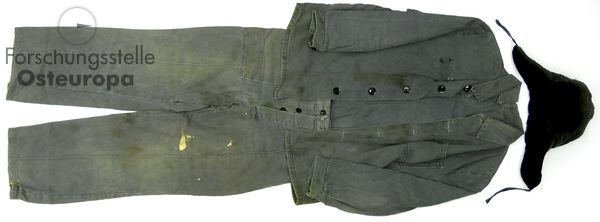Odesa-Tage 2025
Kolloquium, 18:15 Uhr, Zoom
Markian Prokopovych (Durham), Dubious Legacies. Cities of Eastern, East-Central, and South-Eastern Europe, 1850-2000
Buchvorstellung, 18:00 Uhr, Europapunkt Bremen
Mischa Gabowitsch, Mykola Homanyuk, Monuments and Territory: War Memorials in Russian-Occupied Ukraine (auf Deutsch und Englisch)
Diskussion, 18:00 Uhr, Haus der Wissenschaft
Nicht verlieren? Nicht gewinnen? Europas zaudernde Haltung zum russischen Krieg gegen die Ukraine. Gespräch mit Susanne Schattenberg und Reiner Schwalb im Rahmen der Odesa-Tage
Buchvorstellung, 18:00 Uhr, Europapunkt
Anna Veronika Wendland (Marburg), Befreiungskrieg. Nationsbildung und Gewalt in der Ukraine. Gespräch Im Rahmen der Odesa-Tage
Wissenswertes
Georgiy Davydov’s Prison Clothing
In late September 1972, geologist Georgiy Davydov was returning from Chita to Leningrad after field work. On his way he decided to make a stop in Moscow and pick up another batch of samizdat materials. Already in the late 1960s, he actively maintained ties with Moscow and Tallinn dissident groups and distributed samizdat literature. When meeting with his Moscow acquaintances, Davydov did not know that they were already under KGB surveillance. On September 21st, 1972, Davydov was arrested and in summer 1973, he was convicted under Article 70 of the Criminal Code of the RSFSR and charged with anti-Soviet activities, specifically: reproduction, distribution and storage of anti-Soviet literature. Davydov was sentenced to five years of corrective labor camps and two years of exile. To serve his sentence he was sent to the political camp Perm-36.
While in the Perm political camp, Davydov actively defended the rights of political prisoners and participated in various protests. Consequently he was transferred until the end of his term to the Vladimir Prison, where he continued to fight against violations of the law by the administration. After his release from prison, Georgiy Davydov was sent to exile in the city of Tulun, Irkutsk region, where he worked at an agrochemical lab. After having served his full sentence, Davydov returned to Leningrad in the summer of 1979. Together with his wife Valeriya Isakova, Georgiy Davydov participated in the activities of the Fund for the Aid of Political Prisoners and their families. In 1980, under pressure from the KGB, he was forced to emigrate to Germany. Together with his family he settled in Munich and was hired by Radio Svoboda, where he worked until the closure of the radio station in Munich in 1995. Georgij Davydov died in Munich in 2011.
The topic of the Soviet post-Stalinist penitentiary system occupied Davydov throughout his life: he collected and edited materials on various aspects of the Soviet labor camps, compiled lists of (political) prisoners, spoke out publically for them and became one of the first researchers of the post-Stalinist repressive system. A specific topic that Davydov was interested in was the everyday life in Soviet labor camps and prisons: housing, food, clothing. The camp robes of Georgij Davydov as well as the headdress from the special labor camp from the Boris Vayl‘ collection are presented here.The archival holdings of the journalist, bibliographer, dissident and political prisoner Boris Vayl‘ contain extensive correspondences, materials on human rights activities, his own articles and manuscripts as well as Samizdat materials and the manuscripts of other persons.
Alesia Kananchuk
Further reading:
Anonymous: „Protsess Davydovy i Petrova“, Khronika tekushtshykh sobytiy, vyp. 29, 31.7.1973.
Georgiy Davydov, Aleksandr Fel‘dman: Desyat‘ millionov 'epokhi zastoya'. K voprosu o kolichestve zaklyuchënnykh v SSSR, Strana i mir, Nr. 3 (57), 1990, pp. 57-60.
Alesia Kananchuk is an archivist in the Research Center for East European Studies, department "Soviet Union and successor states". Since 2012 she has contributed to a number of research projects including "Generation Kopelev" and the interview archive "Forced Labor 1939-1945".
Länder-Analysen
» Länder-Analysen
» Eastern Europe - Analytical Digests
Discuss Data
Archiving, sharing and discussing research data on Eastern Europe, South Caucasus and Central AsiaOnline-Dossiers zu
» Erdgashandel
» Hier spricht das Archiv
» Russian street art against war
» Dissens in der UdSSR
» Duma-Debatten
» 20 Jahre Putin
» Protest in Russland
» Annexion der Krim
» sowjetischem Truppenabzug aus der DDR
» Mauerfall 1989


